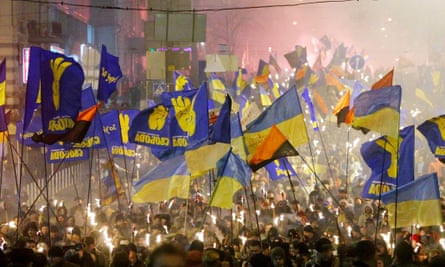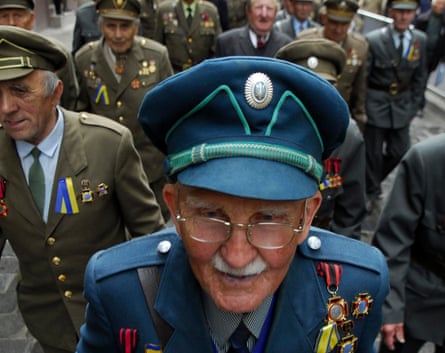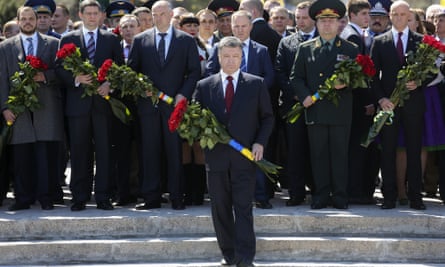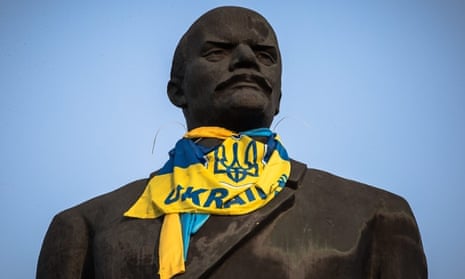In Kiev, a Soviet memorial to the second world war stands at one end of Shevchenko boulevard, which is named after the poet who formulated Ukrainian language and literature as distinct from Russia’s.
The boulevard passes monuments to Mykhailo Hrushevsky, a founder of the short-lived Ukrainian People’s Republic in 1917, and Mykola Shchors, who fought for the Bolsheviks against that republic. It ends with an empty plinth where a statue of Lenin stood until toppled by protesters in late 2013.
Round the corner, where men in camouflage collect donations for Ukraine’s “anti-terrorist operation” in the east, a bookshop – part of a Russian chain – displays a book about Stepan Bandera, the Ukrainian nationalist leader who is a hero for some but also, in deeply entrenched Soviet and Russian rhetoric, the ultimate fascist and Nazi collaborator.
Here in a nutshell is Ukraine’s confused and contradictory commemoration of history. While the country struggles for its future in the ongoing war to reclaim breakaway eastern regions, a war is also being waged to reclaim its past.

The Ukrainian president, Petro Poroshenko, is expected to sign a package of laws on “decommunisation”, recently passed by parliament, which will lay down an official version of Ukrainian 20th century history. The laws ban Nazi and Communist symbols and the “public denial of the criminal nature of the Communist totalitarian regime 1917–1991”; they open former KGB archives; replace the Soviet term “great patriotic war” with the European second world war, and provide public recognition to anyone who fought for Ukrainian independence in the 20th century.
Proponents say the legislation, based on other post-Soviet countries such as Poland and the Baltic states, is long overdue to free Ukraine of a painful past and create a new national identity based on events repressed or rewritten by the Soviet regime.
“The Communist totalitarian regime set out deliberately to destroy national identity,” said Volodymyr Vyatrovych, the 37-year-old historian and head of Ukraine’s National Memory institute, who introduced the laws in parliament. “Many people’s ideas here are still formed by Communist propaganda, and many events from the past are viewed exclusively through the prism of Communist propaganda.”
But others are concerned that the laws will further divide the country by replacing one officially sanctioned version of history with another. “Of course we need history to form a contemporary national identity,” said Vasyl Rasevych, senior researcher at the Institute of Ukrainian Studies in Lviv and editor of the internet journal zaxid.net, in a recent interview. “But unfortunately Ukrainian history is so antagonistic and confrontational, it can’t perform a consolidating function. It doesn’t unite, it divides.”

One of the four bills in the package, On the Legal Status and Honouring of Fighters for Ukraine’s Independence in the Twentieth Century, covers a long list of individuals and organisations from human rights activists to guerrillas accused of ethnic cleansing. It would allow veterans of the Organisation of Ukrainian Nationalists (OUN) and the Ukrainian Insurgent Army (UPA), followers of Bandera, to receive state benefits, and rules that denial or disrespect of their role in fighting for Ukrainian independence is an unlawful “desecration of their memory”.
But even a cursory knowledge of Bandera and the two militias will reveal how contentious their role in history has been - not just for Ukraine and Russia but for Europe. This is especially true for Poland, Ukraine’s current ally against Russia.
Imprisoned for fighting Polish authorities in west Ukraine in the 1930s, Bandera briefly joined sides with the German army to fight the Soviets, only to fall out with both half the OUN and with the Nazis who returned him to prison for most of the war.
In 1943–4, fighters from both militias were implicated in the slaughter of an estimated 70,000–100,000 ethnic Poles in Volhyn and Galicia; there were also atrocities against the Jewish population. After the war, the militias continued a partisan struggle until the 1950s; Bandera emigrated to Germany to be courted by French and British secret services until he was assassinated in 1959 by a KGB agent.
Post-war Soviet history propagated the image of Bandera and the UPA as exclusively fascist collaborators and xenophobes. The term “Banderite” to described his followers gained a recent new and malign life when Russian media used it to demonise Maidan protesters in Kiev, telling people in Crimea and east Ukraine that gangs of Banderites were coming to carry out ethnic cleansing of Russians.

Historians and activists such as Vyatrovych believe now is the time to replace that negative view for a positive one. “I think now people will start to understand that the UPA is a part of Ukrainian history,” Vyatrovych said. “Ukraine needs to remember those who fought and died for their independence, especially now we have a new generation who are fighting and dying for independence.”
Myroslava Petsa is part of that new generation. Her grandmother helped UPA fighters as a teenager while her grandfather was fighting in the Red Army to liberate Europe from the Nazis. “After the second world war they both worked in a collective farm seven days a week, practically as slaves of the Communist and collectivisation system,” said Petsa, a Kiev-based journalist.
“UPA was a very broad popular movement, they were real freedom fighters. But there were also dark sides to their story. What makes me wary of the newly adopted bill is that history isn’t black or white. It takes courage to recognise the dark pages from the past. Own it, say sorry, and then move forward.”
The opening of the archives should allow people to do just that, said Vyatrovych, whose National Memory Institute will now be in charge of the archives. “Not one of these laws aims to regulate or limit academic discussion; on the contrary, opening the KGB archive will stimulate discussion.”
Vyatrovych defended the provision that outlaws public denial or disrespect of aspects of the fight for Ukrainian independence. Publicly calling those who fought collaborators, he said, “is a way of breaking Ukrainian society”.
But Rasevych in Lviv believes that much archival evidence has already been destroyed by partisan researchers on one or the other side of the historical debate, and that the laws will curtail any critical view of recent history in Ukraine. “All we have now are propaganda constructs,” he said. “The ideological struggle is ongoing.”

Comments (…)
Sign in or create your Guardian account to join the discussion